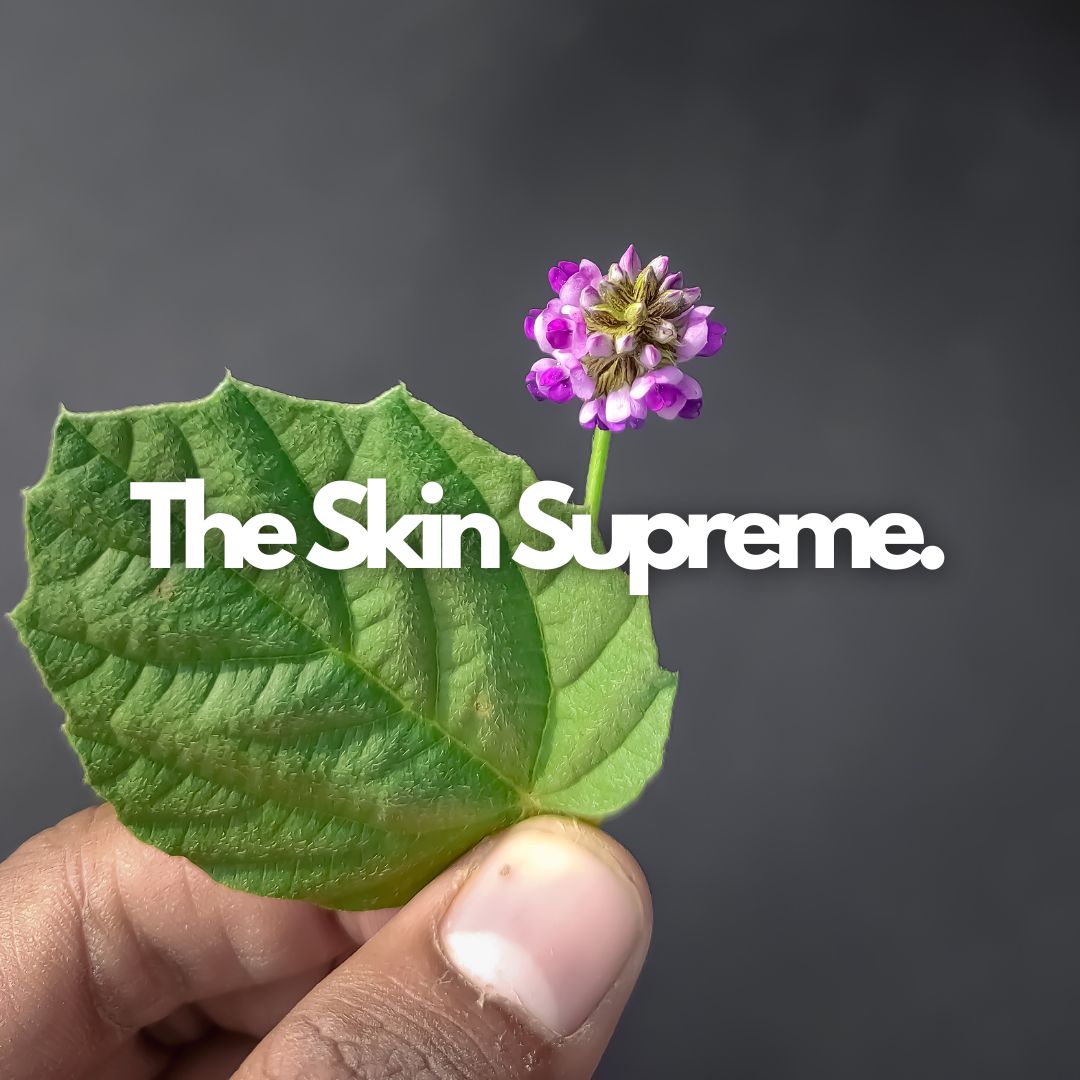
Discover the Power of Bakuchiol: A Natural Alternative to Retinol
Share
In recent years, Bakuchiol has become a hot topic in the skincare industry as a plant-based alternative to retinol. Derived from the seeds and leaves of the Psoralea corylifolia plant, Bakuchiol offers a wide range of benefits for the skin without the harsh side effects associated with traditional retinol. Let's delve into the science behind this fascinating ingredient and explore why it is becoming a favorite in the world of skincare.
The Origins of Bakuchiol
Bakuchiol is a natural compound first isolated in 1966 from the seeds of the Psoralea corylifolia plant, commonly known as "Babchi" in India and "Buguzhi" in China. For centuries, it has been used in traditional Ayurvedic and Chinese medicine to treat various skin conditions due to its powerful anti-inflammatory and antioxidant properties.
The Science Behind Bakuchiol's Efficacy
-
Anti-inflammatory and Antioxidant Properties
Bakuchiol has been shown to have significant anti-inflammatory effects, reducing the activation of microglial cells in the brain and suppressing inflammatory cytokines like TNF-α and IL-6 . This makes it effective in calming irritated skin and reducing redness. Furthermore, Bakuchiol's antioxidant capabilities are noteworthy. It activates the nuclear factor erythroid 2-related factor 2 (Nrf2), a transcription factor that enhances the skin's ability to resist oxidative stress . By neutralizing free radicals, Bakuchiol protects the skin from environmental damage and helps maintain a youthful appearance. -
Brightening and Anti-Pigmentation
Bakuchiol can interfere with the melanin synthesis pathway by blocking both α-melanocyte-stimulating hormone activation and tyrosinase, the enzyme responsible for melanin production . This dual action helps reduce hyperpigmentation and promotes a more even skin tone, making Bakuchiol a powerful agent for brightening the skin. -
Anti-Acne Effects
Clinical studies have demonstrated that Bakuchiol effectively reduces acne. In one study, a 1% Bakuchiol solution was found to reduce acne by 57%, outperforming 2% salicylic acid, which reduced acne by 48% . Additionally, Bakuchiol has been shown to inhibit the growth of Cutibacterium acnes (formerly Propionibacterium acnes), a bacterium that contributes to acne formation . Its anti-inflammatory properties further aid in reducing acne lesions and calming inflamed skin. -
Anti-Wrinkle and Regeneration
Bakuchiol stimulates collagen production and inhibits its breakdown, leading to firmer and more youthful-looking skin . By encouraging cell turnover, Bakuchiol helps smooth the skin's surface, reducing the appearance of fine lines and wrinkles without the irritation often associated with retinol .
Clinical Studies Supporting Bakuchiol's Benefits
A landmark study published in the British Journal of Dermatology compared the effects of 0.5% Bakuchiol cream and 0.5% retinol cream over 12 weeks . Both groups showed significant improvements in reducing fine lines and wrinkles. However, 59% of the Bakuchiol group experienced reduced hyperpigmentation, compared to 44% in the retinol group. Moreover, Bakuchiol users reported fewer instances of skin irritation, such as redness and peeling .
Why Choose Bakuchiol?
Bakuchiol is an excellent choice for those seeking a gentle yet effective skincare ingredient that delivers anti-aging, brightening, and acne-fighting benefits without the typical drawbacks of retinol. Unlike retinol, Bakuchiol does not increase photosensitivity, making it suitable for daytime use when paired with sunscreen. Additionally, its natural origin and vegan-friendly properties appeal to consumers looking for ethical and sustainable beauty solutions .
Conclusion
With its unique ability to mimic the effects of retinol without irritation, Bakuchiol is paving the way for a new generation of skincare products. Its multifaceted benefits make it a versatile ingredient suitable for all skin types, including sensitive and acne-prone skin. Whether you're looking to brighten your complexion, reduce signs of aging, or tackle stubborn acne, Bakuchiol offers a natural and effective solution.
Sources:
-
Dhaliwal, S., Rybak, I., Ellis, S. R., Notay, M., Trivedi, M., Burney, W., & Sivamani, R. K. (2019). Prospective, randomized, double‐blind assessment of topical bakuchiol and retinol for facial photoaging. British Journal of Dermatology, 180(2), 289-296. Link
-
Liu, H., Guo, W., Guo, H., Zhao, L., Yue, L., Li, X., & Qu, Y. (2020). Bakuchiol attenuates oxidative stress and neuron damage by regulating Trx1/TXNIP and the phosphorylation of AMPK after subarachnoid hemorrhage in mice. Frontiers in Pharmacology, 11, 712.
-
Reddy, M. V., Thota, N., Sangwan, P. L., Malhotra, P., Ali, F., Khan, I. A., & Koul, S. (2010). Novel bisstyryl derivatives of bakuchiol: targeting oral cavity pathogens. European journal of medicinal chemistry, 45(7), 3125-3134.
-
Chaudhuri, R. K., & Marchio, F. (2011). Bakuchiol in the management of acne-affected skin. Cosmetics and toiletries, 126(7), 502.
-
Ohno, O., Watabe, T., Nakamura, K., Kawagoshi, M., Uotsu, N., Chiba, T., & Uemura, D. (2010). Inhibitory effects of bakuchiol, bavachin, and isobavachalcone isolated from Piper longum on melanin production in B16 mouse melanoma cells. Bioscience, biotechnology, and biochemistry, 74(7), 1504-1506.
-
Lim, H. S., Kim, Y. J., Kim, B. Y., & Jeong, S. J. (2019). Bakuchiol suppresses inflammatory responses via the downregulation of the p38 MAPK/ERK signaling pathway. International journal of molecular sciences, 20(14), 3574.
